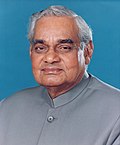This article relies largely or entirely on a single source .(January 2024) |
 | |
| Ministry overview | |
|---|---|
| Formed | 13 October 1999 |
| Preceding Ministry | |
| Dissolved | 22 December 2001 |
| Superseding Ministry | |
| Jurisdiction | Government of India |
The Ministry of Information Technology is a former cabinet-level ministry of the Government of India which was responsible for promoting internet, IT policy and strategy along with e-commerce and knowledge-based industries. The ministry also included the Department of Electronics and took over the Internet and e-commerce services from the Ministry of Communications. The ministry was established on 13 October 1999 by then Prime Minister Atal Bihari Vajpayee. [1]
The Ministry of Information Technology was merged with the Ministry of Communications to form the Ministry of Communications and Information Technology on 22 December 2001. In 2016, the Ministry of Communications and Information Technology was further bifurcated to form the Ministry of Communications and the Ministry of Electronics and Information Technology. Upon the merger, the Department of Information Technology and later the Department of Electronics and IT was created.

